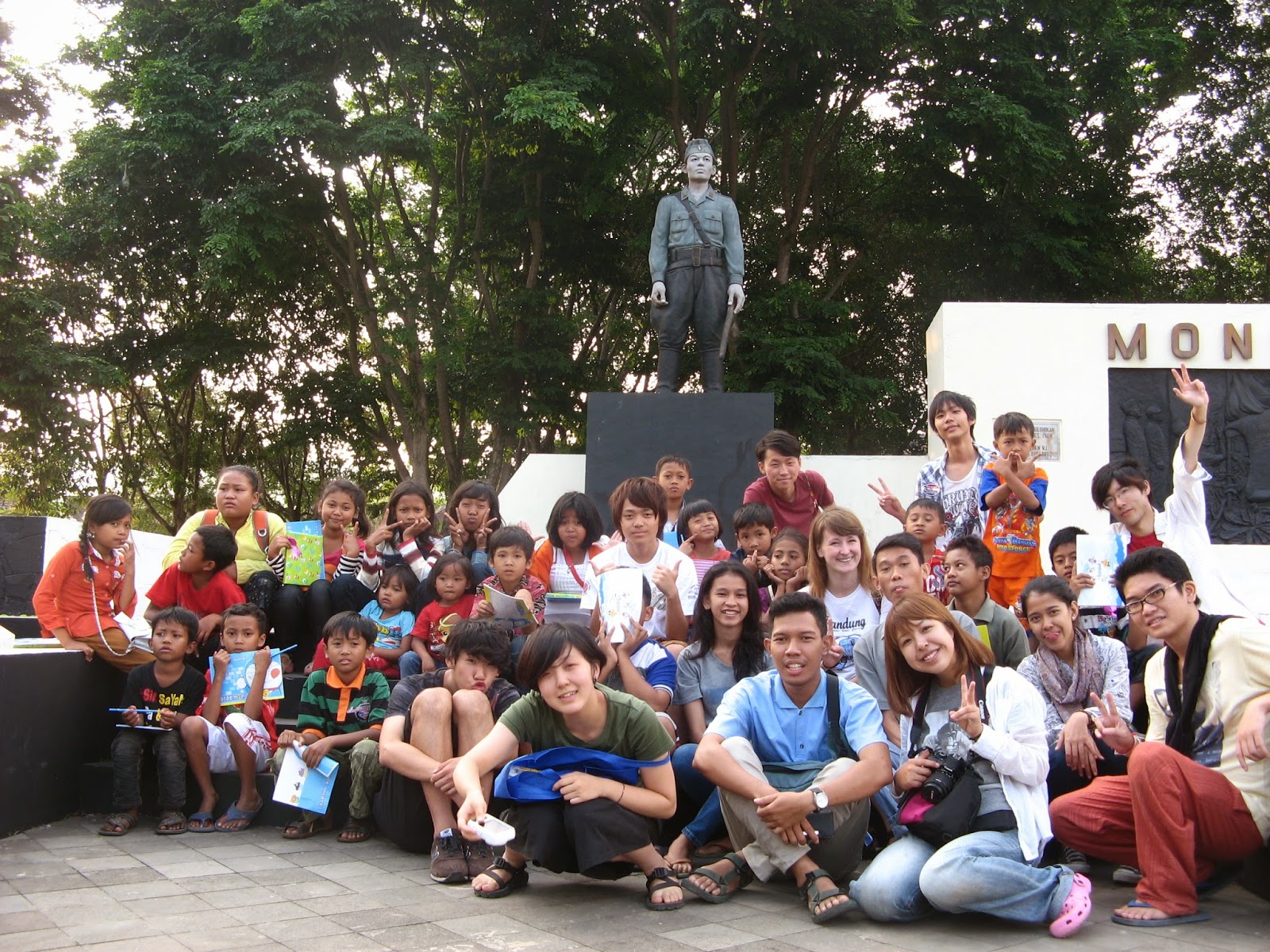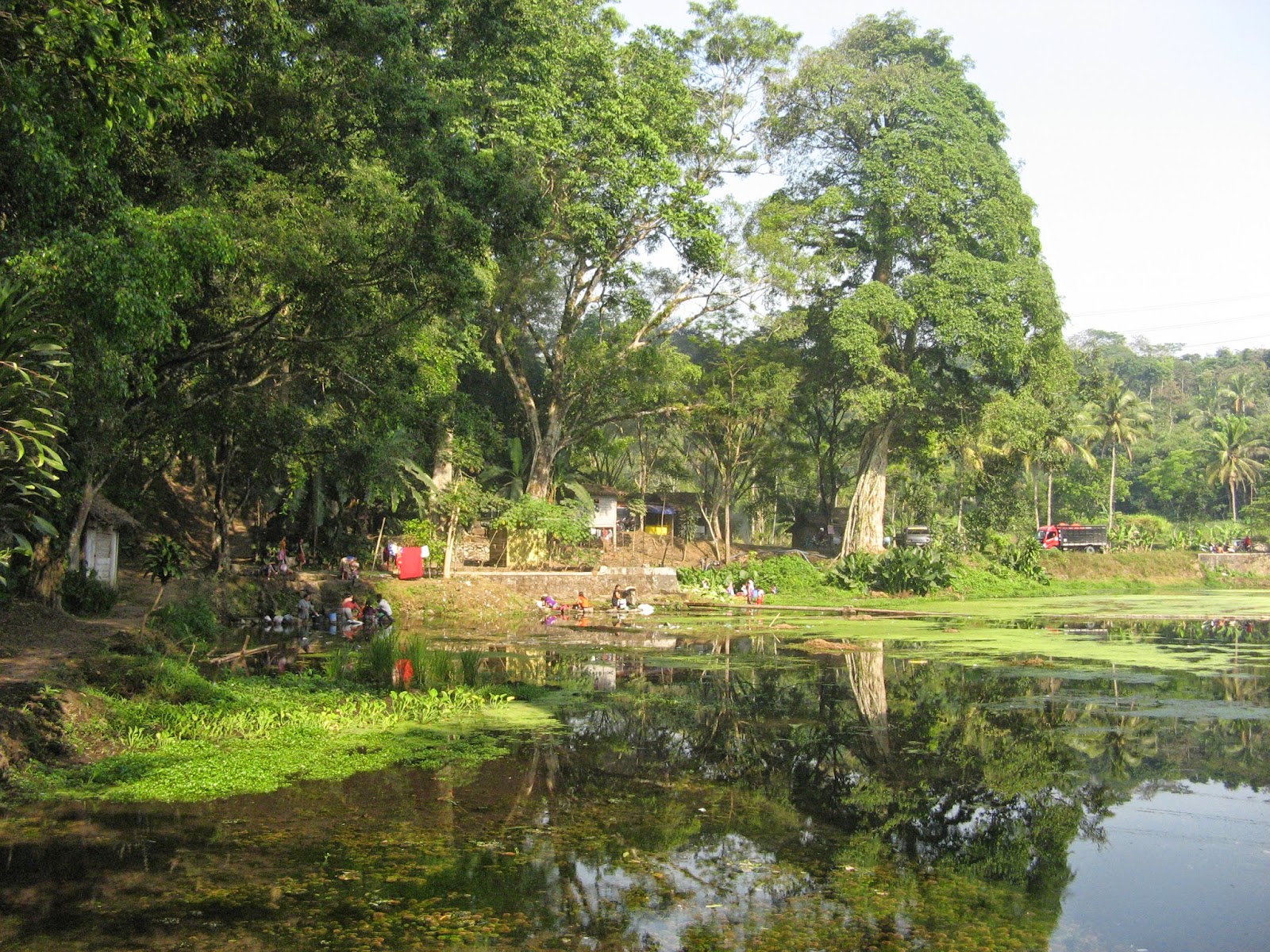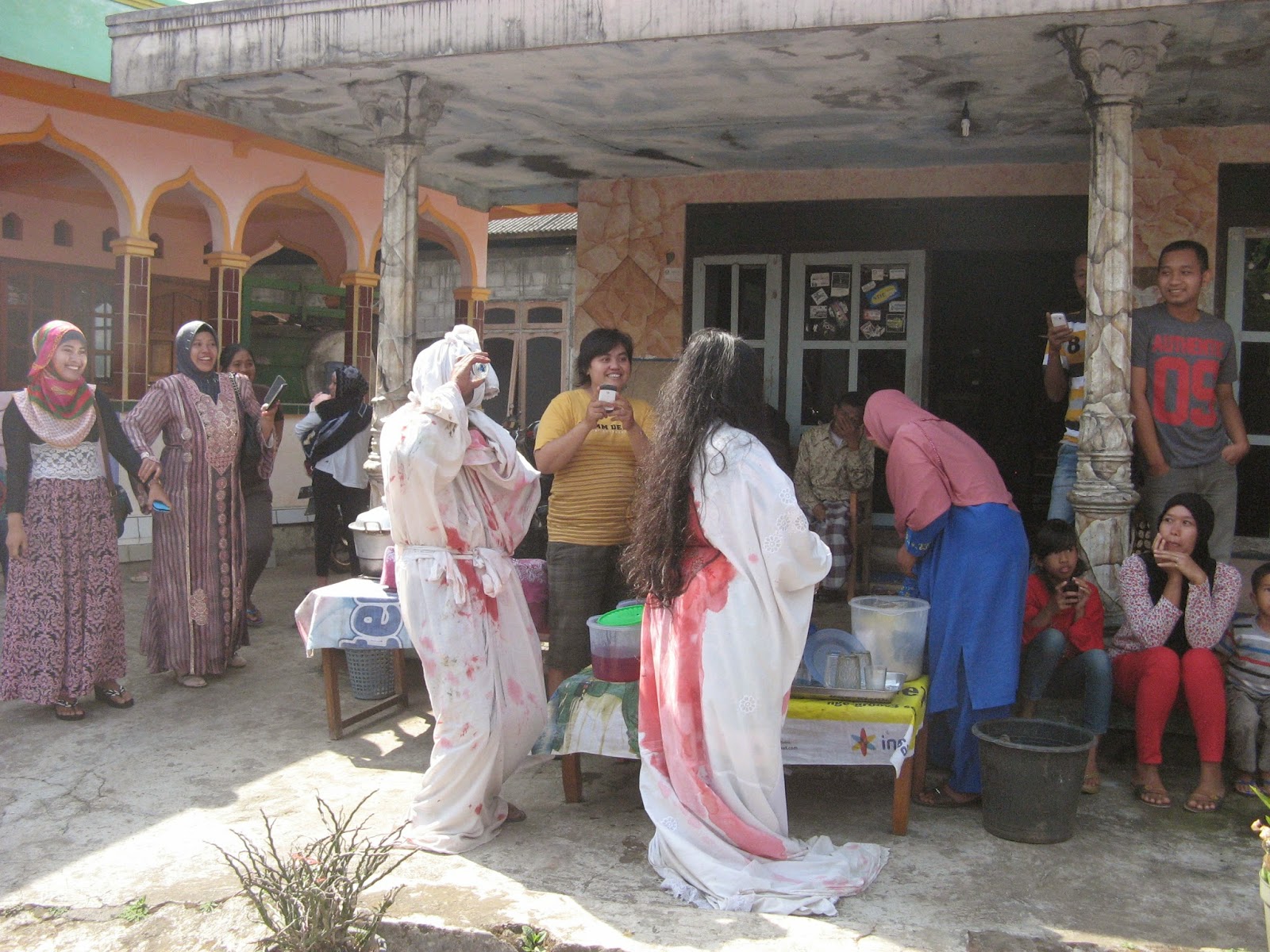I am already in Lithuania. Almost 3 weeks. It was a little bit hard to adjust to being here. It was so cold (the difference of temperature was more than 30 degrees: around 30-35 in Indonesia, and around - 3 in Lithuania). Also, most of the people here dress in black, there is almost no sun, so I miss colours. Ok, I miss a lot of things: the beauty of people walking in batik, the brightness of sun, the culture of not being constantly in a hurry ("pelan-pelan" (or "slowly"), "santai saja" (or "just relax"), "sabar, mbak" (or "patience, sister"), "alon alon asal kelakon" (slowly, but surely)... Now Indonesia looks like a dream, so remote. I cannot believe it was my home for almost 8 months. It's gone now.
But I still have to put some dots. I want to overview my project experience. During these 8 months, I stayed in 7 cities. I joined (or sometimes "joined") the activities of local volunteers, I made interviews with them and so called "local partners" (or members of local communities who assist the volunteers), took photos and also filmmed a lot. So, this a little glimpse of 7 cities in Java and the activities I did or watched (here is the problem of my project: sometimes the volunteers expected me just to be a watcher... but now, I don't wanna write about the bad side of this experience). Here it is. 7 cities and 7 communities of local volunteers of IIWC (Indonesia International Workcamp).
Tegal is the city in Central Java. It is situated about 175 km from Semarang, a capital of the Central Java, and also the city where I always returned after visiting each community. Mainly, just for few days, and just to clean my clothes:)
So, in Tegal I stayed two weeks. From what I saw (and this is mainly the thing, I saw), the local community of IIWC there mainly goes to schools and talks with kids, and through informal interaction, games, etc., encourages them to speak in English. Here is some moments from those two weeks.
They also help one of the teachers to establish an alternative school. Nature school. Here one foreign volunteer Sabine (from Germany) and local volunteers paint one wall in the school.
These are few pictures of Kraton. The palace where still resides a Sultan. Jogja is a special region in Indonesia. The sultan is a mayor here, and this position is inherited.
The thing that I liked the most in Kraton was the museum of Hamengkubuwono IX, the first Governor of the Special Region of Yogyakarta. Especially, I enjoyed the books in his library:)
And here are some pictures:
Tegalrejo is not a city. It's a part of Jatijajar village, and it's a prostitution area. It is located about half an hour from the city of Semarang.
Here the IIWC has a learning house where local children come to play and sometimes to learn. There are no one who constantly lives in the house but sometimes there lives some foreign volunteers for 2-3 months, and sometimes they organize two weeks workcamp with the Japanese organization Nice. Me and my partner stayed there during one of these workcamps.
My video about the workcamp:
And also here are some pictures from a place and workcamp:
But I still have to put some dots. I want to overview my project experience. During these 8 months, I stayed in 7 cities. I joined (or sometimes "joined") the activities of local volunteers, I made interviews with them and so called "local partners" (or members of local communities who assist the volunteers), took photos and also filmmed a lot. So, this a little glimpse of 7 cities in Java and the activities I did or watched (here is the problem of my project: sometimes the volunteers expected me just to be a watcher... but now, I don't wanna write about the bad side of this experience). Here it is. 7 cities and 7 communities of local volunteers of IIWC (Indonesia International Workcamp).
Tegal
Tegal is the city in Central Java. It is situated about 175 km from Semarang, a capital of the Central Java, and also the city where I always returned after visiting each community. Mainly, just for few days, and just to clean my clothes:)
So, in Tegal I stayed two weeks. From what I saw (and this is mainly the thing, I saw), the local community of IIWC there mainly goes to schools and talks with kids, and through informal interaction, games, etc., encourages them to speak in English. Here is some moments from those two weeks.
They also help one of the teachers to establish an alternative school. Nature school. Here one foreign volunteer Sabine (from Germany) and local volunteers paint one wall in the school.
Jogjakarta
We hit Jogja next. We stayed there for one week. There is not a lot to tell about the community of the volunteers. The community here is practicaly dead. But they did organized one seminar, together with other organizations, about the sexual health and reproduction. In this seminar participated doctors, public health specialists, and IIWC community Jogja, on their behalf, invited two volunteers from the Tegalrejo - prostitution area. Here is the moment from the seminar:
And our (me and my partner's) job during this seminar? Well, mainly filmming some parts of the seminar which was held in Indonesian language (that was "very interesting" for us), and afterwards making an interview with two members of Jogja IIWC.
So I cannot tell it was a very busy week, but we explored Jogja. And it is the capital of the Javanese culture.
These are few pictures of Kraton. The palace where still resides a Sultan. Jogja is a special region in Indonesia. The sultan is a mayor here, and this position is inherited.
The thing that I liked the most in Kraton was the museum of Hamengkubuwono IX, the first Governor of the Special Region of Yogyakarta. Especially, I enjoyed the books in his library:)
Next to Kraton you can see how the dolls in wayang kulit (traditional shadow theatre) theatre are made.
Not far from Kraton there is Taman Sari Water Palace
We've met this man in Taman Sari, and he became our guide. The thing that I enjoyed the most about him was that he was crazy about the cinema. He said he would like to be a director, and he would definitely cast me in his movie:). We talked about old Hollywood movies, about Sean Connery, Marilyn Monroe and many others:)
And then, of course, there is a Malioboro street where you can go batik crazy. There are hundreds of shops of batik. And if you start from the beginning, maybe until you reach the shop, the best shop in the Central Java, "Mirota Batik", you already spend all your energy and money. So save it. It's better to go directly there:)
One thing I fell in love, though, while being in Jogja was a trip to Semoya. It's a small village next to Jogja. IIWC has a project there. Usually, there comes a foreign volunteer for 2-3 months and teaches English in the elementary school. The local partner is amazing and the project seemed so nice. I really envied the volunteer who was staying there at the time. And this is the place where I started to speak bahasa Indonesia for the first time of my stay. For me, it was incredible. I knew that if I stayed in this place, I could speak bahasa in a month. Well, local partner offered me that, but my project said I have to move again:)
And this is my video about this community.
Tulungagung
Well, this is not a city. This is a regency (kabupaten) in the East Java. How it is different from the city? Well, as far as I understand - it is surrounded by more rural area. A lot of rice fields around:) But when you are in the centre, it really seems you are in the middle of the city. So do not ask me:)
I lived in Tulungagung almost a month. One week - almost nothing to do, but I've read a lot and also was learning bahasa Indonesia. After that week we moved in one orphanage, or panti asuhan. (We: me, my partner from Poland, Julia, one Spanish girl (Angela) who came just to stay 2 weeks in Tulungagung and 2 Indonesian girls). It was so called "Ramadhan work camp". The idea of us staying there was to teach kids English and to learn more about Islam. And this was a right time and place to do it. It was the month of Ramadhan and the place was the islamic orphanage. So...
The shadow of the mosque in the territory of the orphanage. We lived in this building, on the second floor of this building. Just in front of the mosque.
What did I learn about Islam? Well, a lot. Because I wanted to know as much as possible, I tried to "live" Ramadhan and share this experience with others, and it meant to wake up at 3 o'clock in the morning so we would prepare some food and eat. At around 3.30 the voice from the mosque quite silently starts saying "sahur, sahur, sahur". This indicates that the time has come to eat before fasting begins. Then around 4.30 the time of fasting comes: the muezzin starts to call for the pray of the dawn. This is the time when the Muslim go to pray and I go to sleep again.
The benches in the mosque for the Quran lessons
After this, I used to wake up around 8 and silently would make a coffee (the Muslims should avoid consuming drinks and food from the dawn till dusk, but, well, I tried one day. And it was hard. Just remember that in Indonesia is around 35 degrees of heat. So I drank one cup of coffee and I would drink a little bit of water. And while doing this I wanted to be discreet, because children around me were doing fasting and even though I told them that I do drink a little bit, and did not want them to see it). But I would not eat from the dawn till dusk. After drinking it, I would have an English lesson with kids that almost did not speak English at all. (My partner and Angela got the other group of kids. A bit older ones. This was because my Indonesian was much better than theirs).
First lesson when all of the kids were still together in one group. It did not take long to understand that the level is very different.
The son of the family who took care of the orphanage. Just to be clear, he is too small to be fasting:))). Anyways, the cutest smile I've ever met:)
This is me and Angela with 3 kids from my group. Just after one of the lessons:)
During the month of Ramadhan, the reading of Quran almost never stops. Children of the orphanage change one another and they read Quran all day long.
After the lesson - sleeping again or doing what you want. After some sleeping, some other activities with kids, preparing for other day lessons or some presentations. Around 3.30 we start to cook again. This is for berbuka puasa: around 5.30 you can hear the happiest sound of the day. The azan that lets you eat. I loved it. Not only because I was quite hungry by the time I hear it, but I loved to see the happiness of my friends for whom Ramadhan is not only cultural experience, as for me, but also the spiritual one.
This is the mosque on one evening during the Ramadhan. People are praying Tarawih - not compulsory, but additional prayer in the evening.
Well, the month of Ramadhan is a month when the mosque is almost never empty and silent. But this month is not only about the religious rituals. It is also about sharing with your community, and I've never seen anything like this in my country. Sharing food and love with people you do not know. It's beautiful. I hope I can experience again:)
Apart from an amazing experience in general, I really enjoyed and met some people, in this case kids, in particular. And I loved spending time with them: teaching them English, playing games, talking about my country and their families, their wishes in life, etc...
A moment from the last assignment. They had to speak in English in front of all kids. Well, even though she spoke quite well, it wasn't really loud:)
Us 5 and all the girls but not all the boys.
Me and my group.
Me and my Twilight guy:)
This time it was really hard to go away, but after two weeks we needed to say goodbye. Our project is about moving, not staying. But everytime I remember the face of some kid, I have a smile on my face.
Bandung
Next city - Bandung. It is located in the West Java, and it is the 3rd biggest city in Indonesia. It is one of my favourite cities in Java (having said that, I want also to add that the cities in Java are quite horrible. They all look more or less the same, the architecture are quite unimpressive and there are no public spaces (except the shopping malls), no place to walk for people.)
It is a city of really horribly polluted river Cikapundung: local people use this river as a trash place. But I liked the look and the feel of the city. I loved the Dago street with all its food, I loved that the new mayor decided to have a public square for people to enjoy, and I loved the small streets in the neighbourhood where we stayed.)
We stayed in this city for two weeks. As a part of the work camp that was made with Japanese. In this work camp which focused on the ecology we cleaned the river, tought kids English and planted some plants. 14 people participated in this workcamp: 9 Japanese, 3 Indonesians, 1 Lithuanian and 1 Polish. We lived in two small rooms during this time. It was crowded, uncomfortable but it was fun.
This is my video about this workcamp:
And here are some pictures:
One of my favourite pictures: the man is fishing in Cikapundung. Not because he is hungry, but just for sport:)
The moment of river cleaning
The moment about teaching the kids not to throw garbage into the river
Some images from the 17th of August: the Independence day of Indonesia
Tegalrejo
Tegalrejo is not a city. It's a part of Jatijajar village, and it's a prostitution area. It is located about half an hour from the city of Semarang.
Here the IIWC has a learning house where local children come to play and sometimes to learn. There are no one who constantly lives in the house but sometimes there lives some foreign volunteers for 2-3 months, and sometimes they organize two weeks workcamp with the Japanese organization Nice. Me and my partner stayed there during one of these workcamps.
My video about the workcamp:
And also here are some pictures from a place and workcamp:
One morning in Tegalrejo. The village is quite, the karaoke places are empty. But comes an evening and we can see quite a different picture of this place
Well, I exploited this man with my lenses. But I really like him in the pictures
Even though Tegalrejo is a prostitution area, it has a mosque whose muezzin's voice is just amazing. You can here it in the video (above)
During the workcamp: playing with kids in the ricefield.
During the workcamp we visited the weapons museum:)
During the workcamp we also visited the school where most of the kids from Tegalrejo study. This is the break time:)
In the cabinet of the director of the school. The number of children and their religion.
Pekalongan
Next stop - Pekalongan. A city close to Tegal. Located in Central Java.
We came there for a week, and let me tell you that is the best community the IIWC has. This volunteering works. They have 3 main spots where they engage with kids. They play with them, teach them English, play sports, stage the playes, and even, and it is my favourite moment - they have a moving library. They come with books on the bicycle and read with kids.
Here are some pictures:
Salatiga
I love this small city in Central Java with a view of the Mountain Merbabu. We spent there 1 week watching the local volunteers almost not doing anything (sorry about that, but it is true. at least for that week). And then we came back there for 3 weeks for video editing:)
We went with local volunteers to clean this river. Well, we spent there 20 minutes "cleaning", so no pictures from that, but here is the view I enjoyed: people washing their clothes or carpets.
But with local volunteers we went to see a carnival which was in some village near Salatiga. I do not remember the name of the village though, but I enjoyed the views:)
In salatiga we stayed in the Muhammadiya boys orphanage (jalan Kauman). Near it there are some good places to eat. One of them is here:





























































Komentarai
Rašyti komentarą